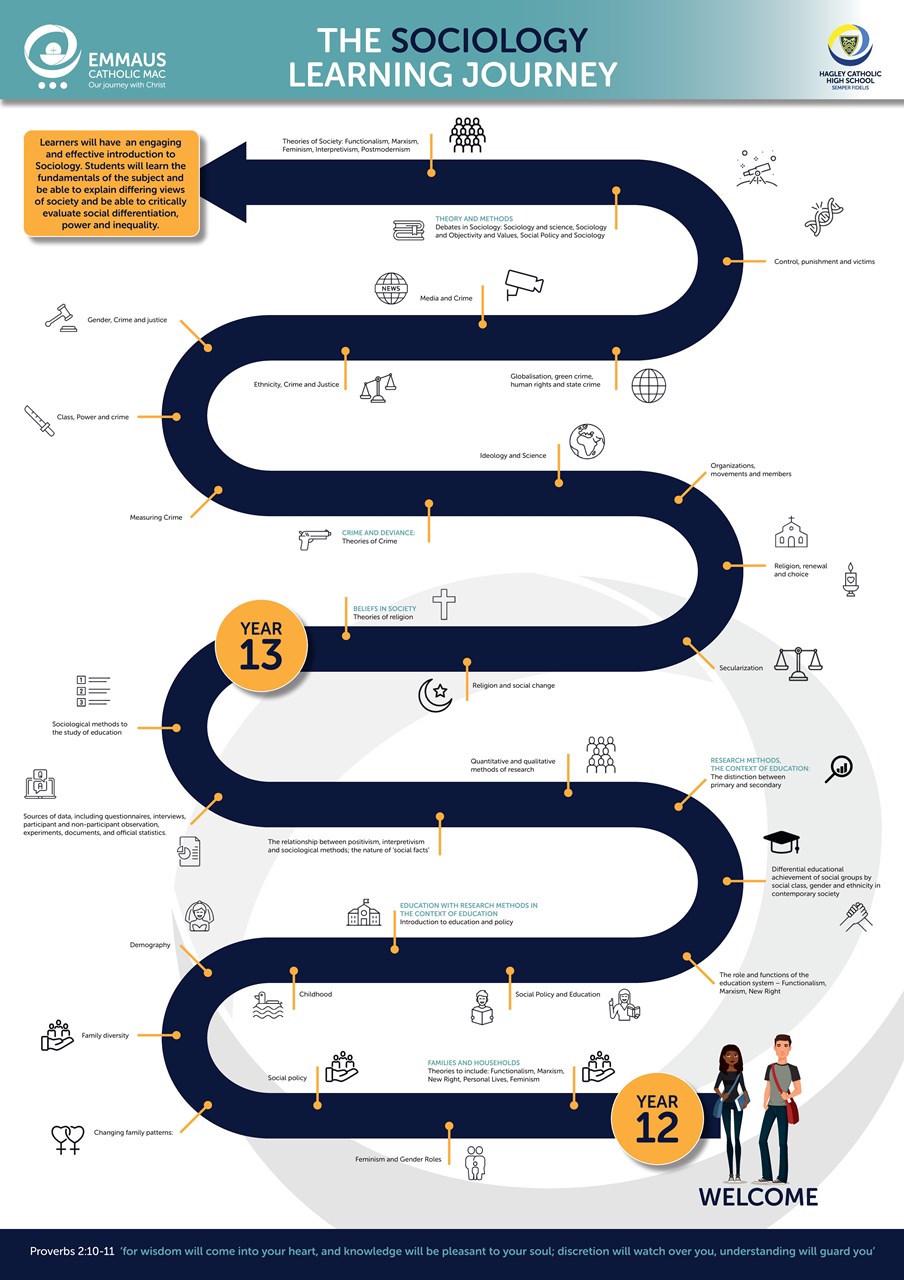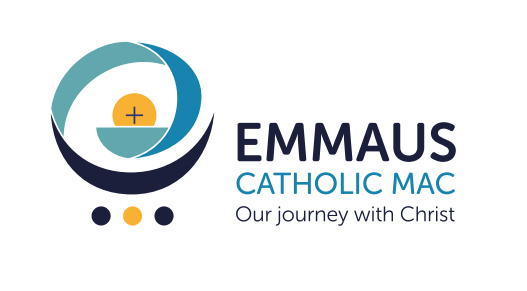Our Sociology Department
Mrs S Ravat - Subject Leader for Sociology - sravat@emmausmac.com
To view the curriculum mapping document and the 'learning journey' poster for Sociology, then please click on the links below. If you have any queries then please contact the Subject Leader.
Subject Overview
Vision
The A level Sociology Program prepares one for a lifetime of change by developing one's appreciation of diversity, love of learning, writing and study skills, and knowledge base about human behaviour, social organization, culture, and social change. The study of sociology helps the individual to understand human society and how social systems work. Sociology is also important for individuals because it throws light on the problems of the individuals.
In our increasingly diverse world, the study of sociology gives the pupils the skills 21st century workers need: critical and analytical thinking, writing ability, cultural competence, and self-awareness. These are sequenced across year 12 and year 13. Pupils use the skills from KS4 subjects like English, History, Geography, Health and Social Care and learn to apply them to sociology.
The subject specific skills gained from Sociology the ability to describe and explain social and organisational systems and structures. In year 12 pupils study social structures of the Family and Education. In Year 13 pupils continue the theme of structures by learning about Beliefs in Society and Crime and Deviance.
Sociology allows Solving Social Problems through investigations. Pupil learn research methods and show how social scientists implement them to investigate social issues. This allows the pupils to examine human society within larger social, political and economic contexts. One of the major benefits of being a sociologist is the chance to influence efforts to solve social problems by conducting research and using the evidence to influence policy.
Transferable skills
- strong written and oral communication skills;
- the ability to understand complex ideas and apply these to practical situations;
- research and analytical skills, including the ability to conduct interviews, surveys, focus groups and interpret and challenge numerical data and statistics.
Year 12
Students must study the following two core themes:
- socialisation, culture and identity
- social differentiation, power and stratification.
The themes should be understood and applied to particular substantive areas of Sociology. These themes are to be interpreted broadly as threads running through many areas of social life and should not therefore be regarded as discrete topics.
In addition, students must understand the significance of conflict and consensus, social structure and social action, and the role of values.
The central focus of study in this specification should be on UK society today, with consideration given to comparative dimensions where relevant, including the siting of UK society within its globalised context.
Families and Households:
Students are expected to be familiar with sociological explanations of the following content:
- the relationship of the family to the social structure and social change, with particular reference to the economy and to state policies
- changing patterns of marriage, cohabitation, separation, divorce, childbearing and the life course, including the sociology of personal life, and the diversity of contemporary family and household structures
- gender roles, domestic labour and power relationships within the family in contemporary society
- the nature of childhood, and changes in the status of children in the family and society
- demographic trends in the United Kingdom since 1900: birth rates, death rates, family size, life expectancy, ageing population, and migration and globalisation.
Education, Theory, and Methods:
Students are expected to be familiar with sociological explanations of the following content:
- the role and functions of the education system, including its relationship to the economy and to class structure
- differential educational achievement of social groups by social class, gender and ethnicity in contemporary society
- relationships and processes within schools, with particular reference to teacher/pupil relationships, pupil identities and subcultures, the hidden curriculum, and the organisation of teaching and learning
- the significance of educational policies, including policies of selection, marketisation and privatisation, and policies to achieve greater equality of opportunity or outcome, for an understanding of the structure, role, impact and experience of and access to education; the impact of globalisation on educational policy.
Theory and Methods
Students must examine the following areas:
- quantitative and qualitative methods of research; research design
- sources of data, including questionnaires, interviews, participant and non-participant observation, experiments, documents and official statistics
- the distinction between primary and secondary data, and between quantitative and qualitative data
- the relationship between positivism, interpretivism and sociological methods; the nature of 'social facts'
- the theoretical, practical and ethical considerations influencing choice of topic, choice of method(s) and the conduct of research
- consensus, conflict, structural and social action theories
- the concepts of modernity and post-modernity in relation to sociological theory
- the nature of science and the extent to which Sociology can be regarded as scientific
- the relationship between theory and methods
- debates about subjectivity, objectivity and value freedom
- the relationship between Sociology and social policy.
Year 13
Beliefs in Society
Students are expected to be familiar with sociological explanations of the following content:
- ideology, science and religion, including both Christian and non-Christian religious traditions
- the relationship between social change and social stability, and religious beliefs, practices and organisations
- religious organisations, including cults, sects, denominations, churches and New Age movements, and their relationship to religious and spiritual belief and practice
- the relationship between different social groups and religious/spiritual organisations and movements, beliefs and practices
- the significance of religion and religiosity in the contemporary world, including the nature and extent of secularisation in a global context, and globalisation and the spread of religions.
Crime and Deviance:
Students are expected to be familiar with sociological explanations of the following content:
- crime, deviance, social order and social control
- the social distribution of crime and deviance by ethnicity, gender and social class, including recent patterns and trends in crime
- globalisation and crime in contemporary society; the media and crime; green crime; human rights and state crimes
- crime control, surveillance, prevention and punishment, victims, and the role of the criminal justice system and other agencies.
Theory and Methods
Students must examine the following areas:
- quantitative and qualitative methods of research; research design
- sources of data, including questionnaires, interviews, participant and non-participant observation, experiments, documents and official statistics
- the distinction between primary and secondary data, and between quantitative and qualitative data
- the relationship between positivism, interpretivism and sociological methods; the nature of 'social facts'
- the theoretical, practical and ethical considerations influencing choice of topic, choice of method(s) and the conduct of research
- consensus, conflict, structural and social action theories
- the concepts of modernity and post-modernity in relation to sociological theory
- the nature of science and the extent to which Sociology can be regarded as scientific
- the relationship between theory and methods
- debates about subjectivity, objectivity and value freedom
- the relationship between Sociology and social policy.
Assessment
The subject specification has been designed with the clear objective of addressing the requirements above and will encourage students to:
- acquire knowledge and a critical understanding of contemporary social processes and social changes
- appreciate the significance of theoretical and conceptual issues in sociological debate
- understand and evaluate sociological methodology and a range of research methods through active involvement in the research process
- develop skills that enable individuals to focus on their personal identity, roles and responsibilities within society
- develop a lifelong interest in social issues.
Asessment Objectives:
Assessment objectives (AOs) are set by Ofqual and are the same across all AS and A-level Sociology specifications and all exam boards.
The exams will measure how students have achieved the following assessment objectives.
- AO1: Demonstrate knowledge and understanding of:
1 - sociological theories, concepts and evidence
2 - ociological research methods
- AO2: Apply sociological theories, concepts, evidence and research methods to a range of issues
- AO3: Analyse and evaluate sociological theories, concepts, evidence and research methods in order to:
1 - present arguments
2 - make judgements
3 - draw conclusions
Pupils are expected within each year group to submit assessed essays on a fortnightly basis which tracks and monitors progress. This is designed to help practise exam style questions.
Pupils are given mock exam throughout the year to help achieve target grades. Mocks are assessed in both January and May for both Year 12 and Year 13.







